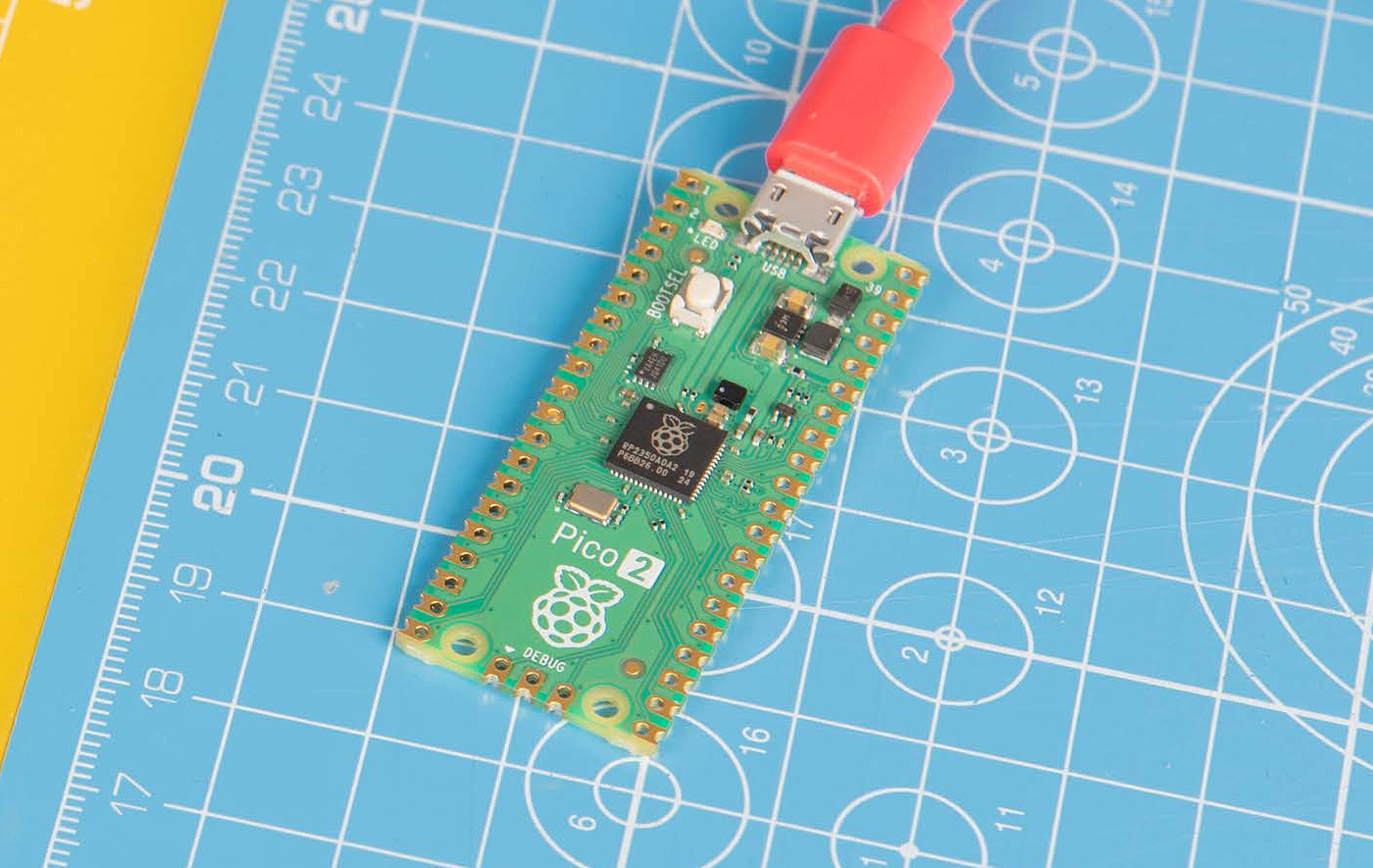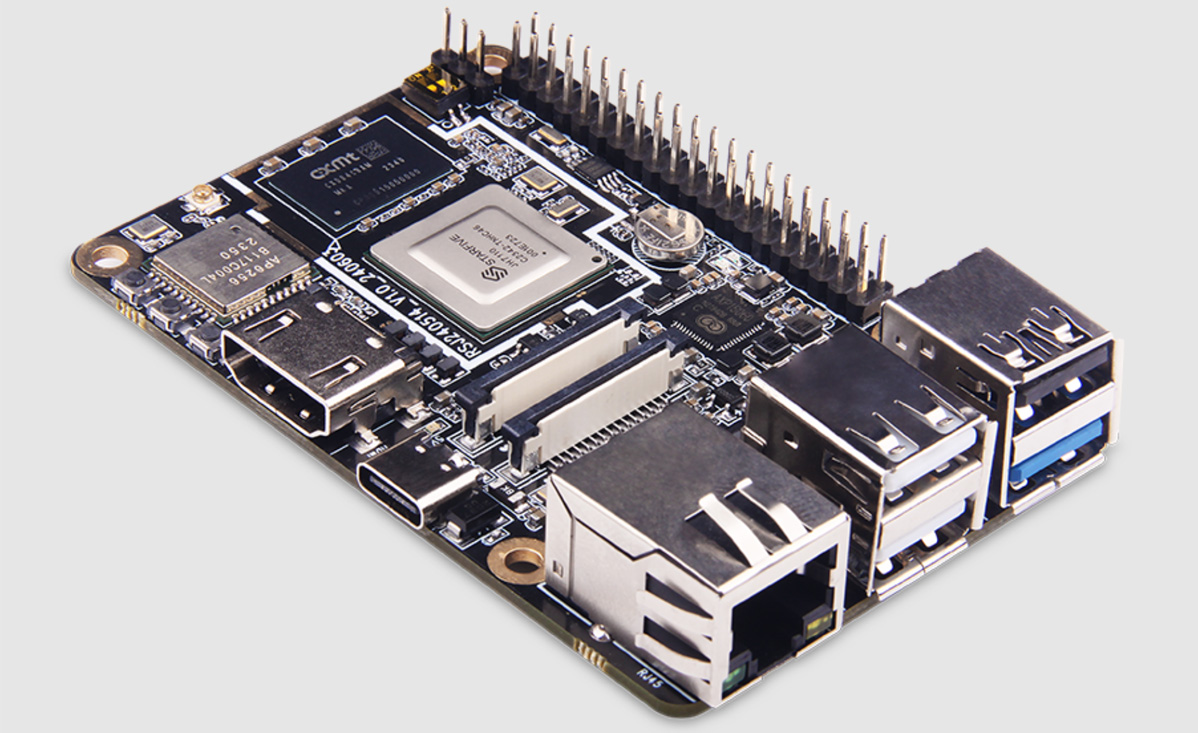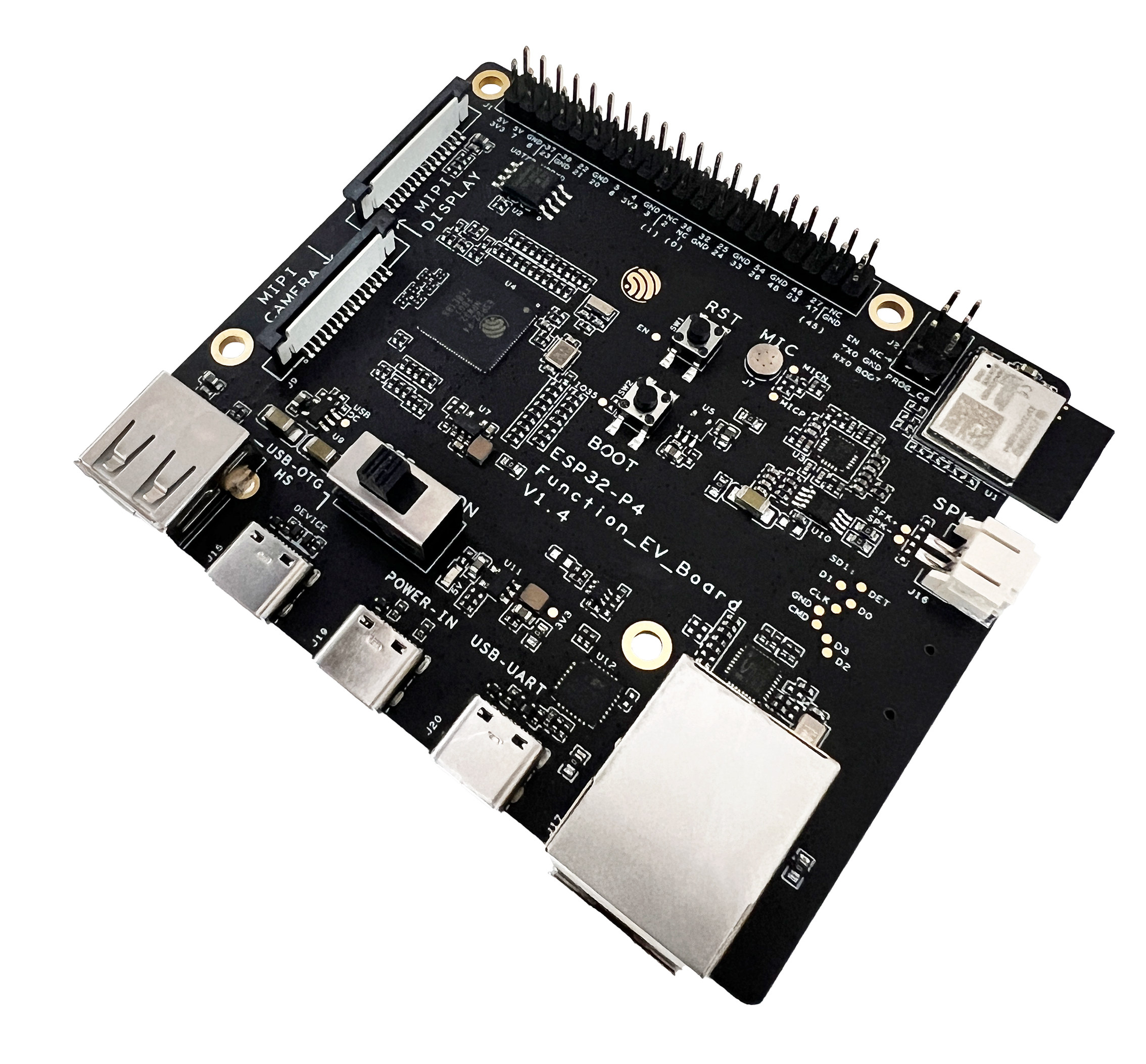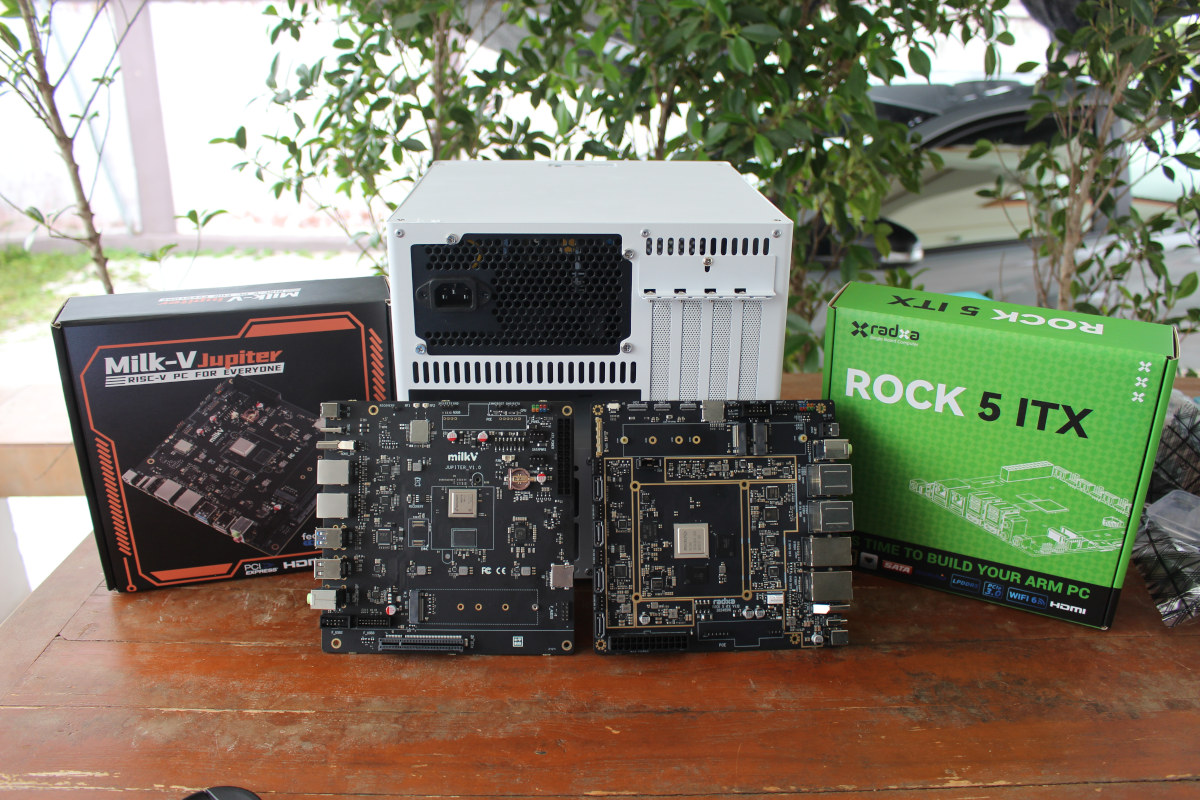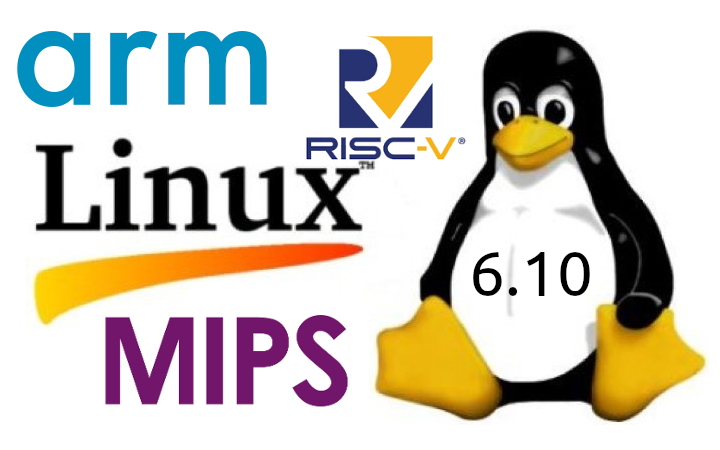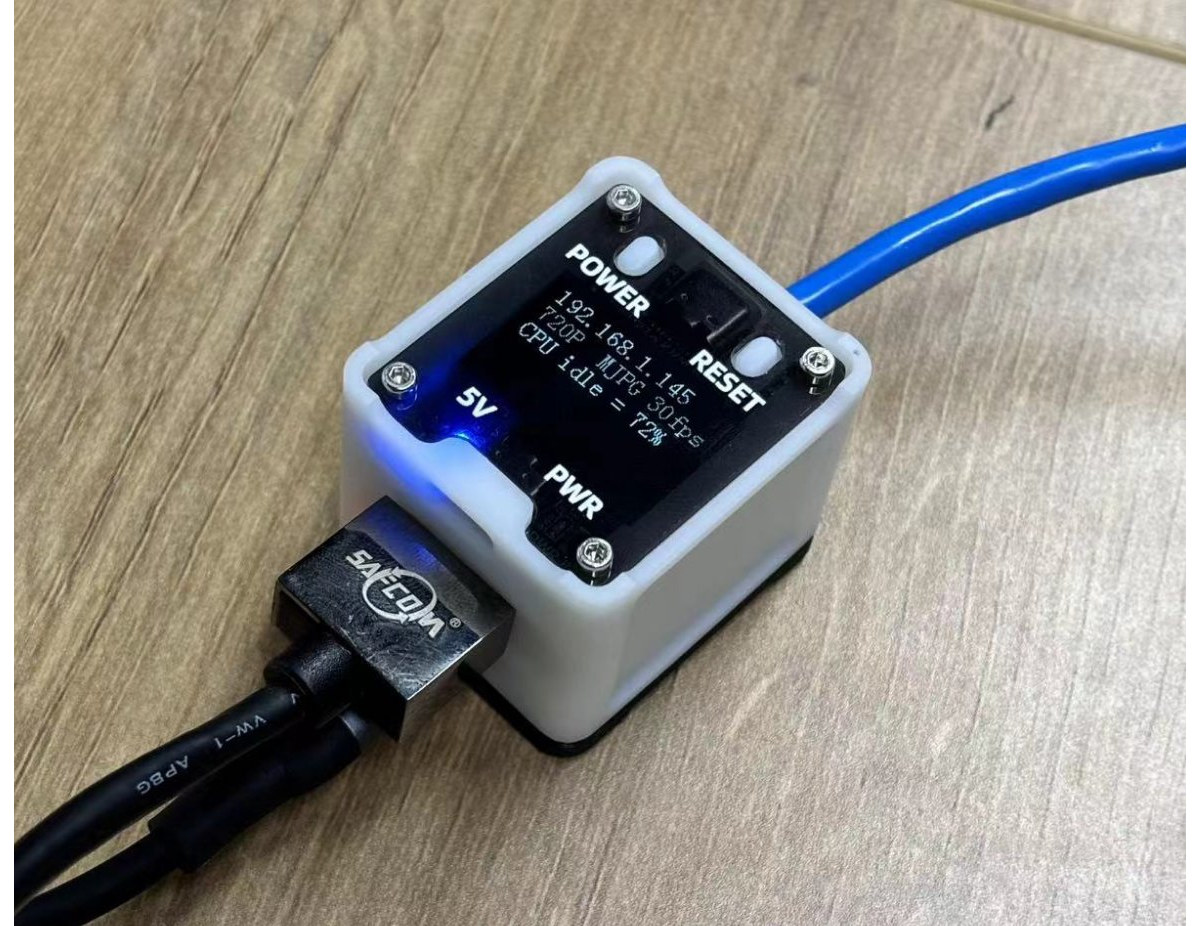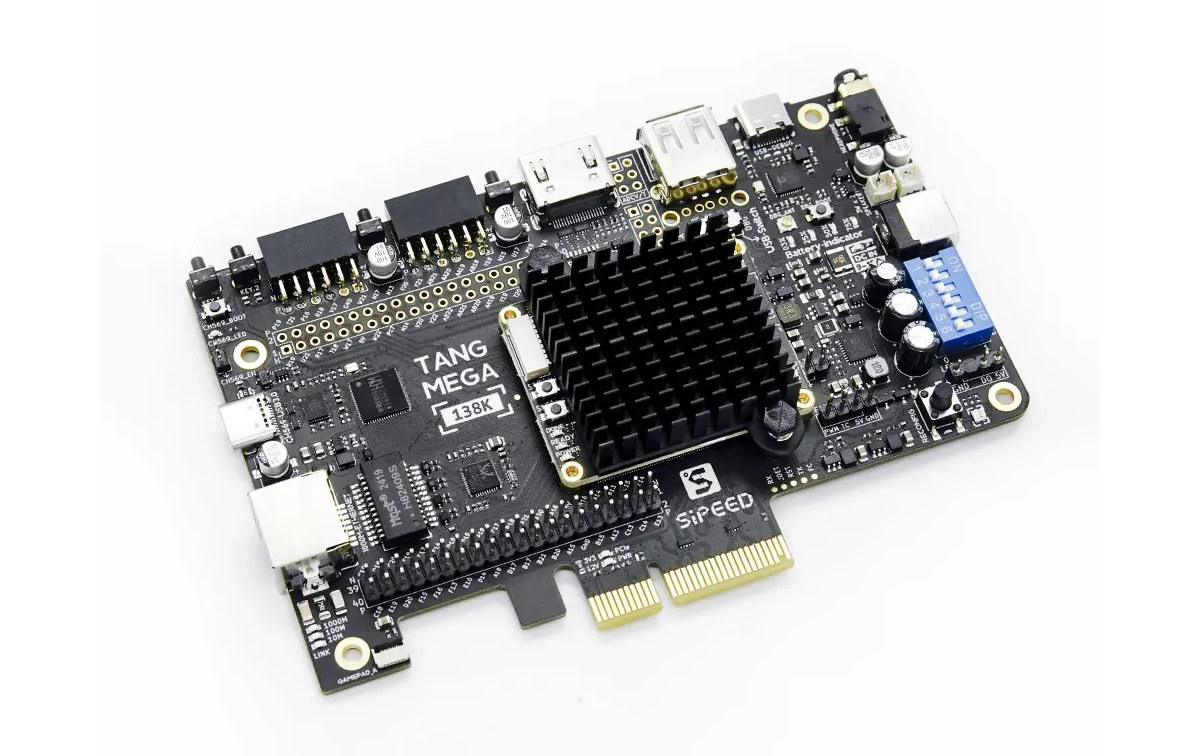The Raspberry Pi Pico 2 is an MCU development board based on the new Raspberry Pi RP2350 dual-core RISC-V or dual-core Cortex-M33 microcontroller with 520 KB on-chip SRAM, a 4MB flash, a micro USB port for power and programming and the same GPIO headers as the Raspberry Pi Pico board with an RP2040 dual-core Cortex-M0+ microcontroller with 264KB SRAM. The RP2350 embeds both an open-source Hazard3 RISC-V dual-core CPU and a dual-core Cortex-M33, but only one cluster can be used at a given time. Apart from the faster MCU cores and higher SRAM capacity, the RP2350 is about the same as the RP2040, albeit it also adds one extra PIO block bringing the total to three. One important new feature is built-in security when using Arm Cortex-M33 cores with Trustzone and other security features. Raspberry Pi RP2350 microcontroller Let’s have a closer look at the RP2350 microcontroller, before checking out […]
Geniatech XPI-7110 – A Raspberry Pi-sized RISC-V SBC based on StarFive JH7110 processor
Geniatech XPI-7110 is a RISC-V single-board computer (SBC) built on StarFive JH7110 with a form factor similar to that of a Raspberry Pi 3 and equipped with up to 8GB of RAM, 256GB of eMMC storage. It comes with various I/O options including USB ports, HDMI 2.0, GbE Ethernet, Wi-Fi/BT, GPIO, camera, display, and much more. The company also mentions that the board will be available in both commercial and industrial variants and will include a 10+ year lifecycle The new Geniatech board is very similar to the Milk-V Mars that we wrote about a few months ago. Additionally, we have written about PineTab-V, Pine64 Star64 SBC, and Milk-V Meles SBC all of which are built around the StarFive JH7110 or T-Head TH1520 RISC-V SoC, feel free to check those out if you are interested in the topic. Geniatech XPI-7110 SBC specifications: SoC – StarFive JH7110 CPU – Quad-core RISC-V processor […]
ESP32-P4-Function-EV-Board development board launched for $55 with 7-inch display and camera module
Espressif Systems “ESP32-P4-Function-EV-Board” – the official ESP32-P4 development board – is now available in limited quantities on Espressif’s AliExpress store for $55.44, and some other AliExpress stores at a premium as part of a kit with a 7-inch touchscreen display and a 2MP camera module. First unveiled in January 2023, the ESP32-P4 is the first general-purpose RISC-V microcontroller from Espressif Systems without any wireless connectivity. It’s a high-end microcontroller with two RISC-V cores clocked at 400 MHz, vector instructions for AI acceleration, a 2D graphics accelerator for smooth graphical user interfaces, and H.264 video encoding support. There’s been some buzz about it in recent months, and finally, it’s now possible to purchase an ESP32-P4 board for evaluation and software development. ESP32-P4-Function-EV-Board development board specifications: Microcontroller – Espressif Systems ESP32-P4 CPU Dual-core RISC-V HP (High-performance) CPU @ up to 400 MHz with AI instructions extension and single-precision FPU, 768KB of on-chip […]
Building a workstation with Radxa ROCK 5 ITX (Arm) or Milk-V Jupiter (RISC-V) mini-ITX motherboard – Part 1: The hardware
Radxa ROCK 5 ITX is a mini-ITX motherboard powered by a Rockchip RK3588 octa-core Cortex-A76/A55 processor, and the Shenzhen Milk-V Jupiter is another mini-ITX motherboard, but based on SpacemIT K1 octa-core 64-bit RISC-V processor instead. When Radxa contacted me about reviewing those, I thought it would be interesting to review a complete kit with a mini-ITX case since I had never built this type of system myself. Yesterday, I was surprised to receive two large packages and thought maybe a company sent me a 3D printer or laser engraver kit, but instead, I got one package with the two Arm and RISC-V mini-ITX motherboards and another with a mini-ITX NAS enclosure with 6x SATA bays. Radxa ROCK 5 ITX unboxing Let’s look at the ROCK 5 ITX motherboard and accessories first. The motherboard ships with a rear panel and two screws for the M.2 module. The motherboard features the Rorkchip […]
Linux 6.10 Release – Notable changes, Arm, RISC-V, and MIPS architectures
Linux Torvalds has announced the release of Linux 6.10 on LKML: So the final week was perhaps not quote as quiet as the preceding ones, which I don’t love – but it also wasn’t noisy enough to warrant an extra rc. And much of the noise this last week was bcachefs again (with netfs a close second), so it was all pretty compartmentalized. In fact, about a third of the patch for the last week was filesystem-related (there were also some btrfs latency fixes and other noise), which is unusual, but none of it looks particularly scary. Another third was drivers, and the rest is “random”. Anyway, this obviously means that the merge window for 6.11 opens up tomorrow. Let’s see how that goes, with much of Europe probably making ready for summer vacation. And the shortlog below is – as always – just the last week, not some kind […]
Microchip PIC64GX is a quad-core 64-bit RISC-V microprocessor for real-time processing
Microchip has introduced its first 64-bit RISC-V microprocessor family with the PIC64GX pin-to-pin compatible with the company’s PolarFire SoC FPGA devices and designed for edge designs for the industrial, automotive, communications, IoT, aerospace, and defense segments. The PIC6GX MPU supports asymmetric multiprocessing (AMP) to run Linux, real-time operating systems, and bare metal in a single processor cluster with secure boot capabilities. The company further claims the PIC64GX MPU is “the first RISC-V multi-core solution that is AMP capable for mixed-criticality systems”. The first member of the PIC64GX RISC-V family is the PIC64GX1000 microprocessor. Microchip PIC64GX1000 specifications: CPU Quad-core SiFive U54 64-bit five-stage, single-issue, in-order pipeline RISC-V (RV64GC) processor at up to 625 MHz with AMP and deterministic latencies, PMP and MMU units Single-core SiFive E51 64-bit RISC-V (RV64IMAC) monitor processor core at up to 625 MHZ with PMP unit Cache L1 memory subsystem with Single-Error Correct, Double-Error Detect (SECDED) Flexible […]
$20+ NanoKVM is a tiny low-power RISC-V KVM over IP solution
Sipeed NanoKVM is a tiny KVM over IP solution based on the Lichee RVNano RISC-V microcontroller board that offers most of the features provided by the popular Raspberry Pi 4-based PiKVM solution allowing users to fully remote control a host such as a computer, server, or SBC down to the BIOS level and power on/off. Two variants are available, namely the NanoKVM Lite and NanoKVM Full. Both support up to 1080p60 displays, virtual USB keyboard and mouse, USB storage emulation, Ethernet with Wake-on-LAN, and IPMI (Intelligent Platform Management Interface) through serial interfaces, but the Full version also adds a resin enclosure, 0.96-inch information display, ATX power control through USB-C port, a microSD card with the firmware, and optional WiFi or PoE support Sipeed NanoKVM specifications: SBC – Sipeed RVNano SoC – SOPHGO SG2002 Main core – 1GHz 64-bit RISC-V C906 or Arm Cortex-A53 core (the latter is likely not used […]
Sipeed Tang Mega 138K Dock is a lower-cost GOWIN GW5AST FPGA + RISC-V development board
The Sipeed Tang Mega 138K Dock is a low-cost version of the Tang Mega 138K Pro development board launched last year with the GOWIN GW5AST FPGA + RISC-V SoC, two SPF+ cages, a PCIe 3.0 x4 interface, and DVI Rx and Tx ports. The new Tang Mega 138K Dock keeps a GW5AST FPGA SoC but with a 484-ball package that fits on a smaller system-on-module, and does without the SPF+ cages, replaces the PCIe 3.0 x4 interface with a PCIe 2.0 x4 interface, and only uses a single HDMI port for DVI Rx or Tx. Sipeed Tang Mega 138K system-on-module Let’s first have a look at the specifications of the SoM itself: SoC FPGA – GOWIN GW5AST-LV138FPG484A with 138,240 LUT4 1,080 Kb Shadow SRAM (SSRAM) 6,120 Kb Block SRAM (BSRAM) Number of BSRAM – 340 298x DSP slices 12x PLLs 16x global clocks 24x HCLK 8x transceivers at 270Mbps to […]


